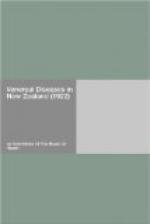Needless to say, these gloomy anticipations have not been realized. Probably the more enlightened generations to succeed us will wonder how there could ever have been any opposition to the notification of venereal disease, just as we to-day read Sir W. Foster’s words and marvel that any person of intelligence could have committed himself to such statements.
Notification of infectious diseases and isolation of patients suffering from such diseases have for many years been compulsory. Isolation, when spoken of by opponents to a similar measure for venereal diseases, is opprobriously described as “compulsory detention.” For twenty years it has been the law in New Zealand that an authorized medical practitioner may examine any person suspected to be suffering from any infectious diseases (save venereal diseases), and the Medical Officer of Health may, if he deems it expedient in the interests of the public health, compel the removal to a hospital of any person so suffering. This long-established procedure as referable to venereal diseases is by antagonists termed “compulsory examination” and “compulsory removal.”
It is contended by some witnesses that notification will drive these diseases underground; but syphilis and gonorrhoea for generations past have been underground.
Under the present system numbers of unfortunate persons either delay calling in medical assistance until the case has become almost desperate so far as the patient is concerned, or they resort to unqualified persons, with the result that in most cases what was in the first instance a simple attack, capable of treatment, results in serious complications most difficult to deal with. In either case the patient may be communicating diseases to others, and should this come to the knowledge of the Health Department it has no effective means of checking him—no power to warn those who are being endangered by his criminal neglect.
The Committee think there is some force in the argument that notification by name, in the first instance, as in the case of ordinary infectious diseases, would tend to discourage some from coming forward for medical treatment. They recommend, therefore, the adoption of what is known as the system of conditional notification embodied in the West Australia Act. Under this plan the cases are notified by the doctor to the Health Department by number or symbol only. The name is not sent in unless the patient discontinues treatment before he is free from infection and refuses either to go to a clinic or to another doctor. In cases of those who “play the game,” the name of the patient is kept confidential, and does not pass beyond the medical man attending him. It is only in cases of those who contumaciously refuse to do what is necessary for their own safety and the safety of others that the name is sent to the Health Department, in order that appropriate steps may be taken in the interests of public health. Even then the name is given only to officers who are pledged to keep it confidential.




